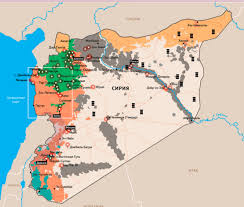March 2016
As senior Iranian regime officials continue to complain about the
Lebanese Hezbollah blacklisting, recent developments across the Middle East
have placed Tehran before even further dilemmas. As mullah Ahmad Khatami, an
ultraconservative figure very close to supreme leader Ali Khamenei, continued
to moan for Hezbollah, various meetings were taking place between European
leaders and Russia in France.
Ahmad Khatami asked why had they blacklisted the “brave Hezbollah” to
which “Lebanon owes its security to”? In France, however, foreign ministers of
the “EU3”, consisting of France, Britain and Germany held meetings and press
conferences along with the E.U. foreign policy chief Federica Mogherini. There
were also separate meetings between French President Francoise Holland and
Saudi Crown Prince Mohammad and the German Chancellor Angela Merkel focusing on
strengthening the ceasefire and the necessity to pursue a political solution
without Bashar Assad. This has added to the mullahs’ worries, very visible in
Iran’s media outlets.
The question now is why is the Iranian regime so concerned about
developments in the region, including Hezbollah being placed on the terrorist
list? While the answer lies in the question, one can find more insight through
various media outlets and stances taken by senior Iranian regime officials and
elements.
The Iranian regime claims Hezbollah was “responsible for the ground
war in the strategy of Russia’s presence in Syria.” On the other hand Iran
claims “Saudi Arabia and other Arab states” have blacklisted Hezbollah to
politically pave the path for their military campaign in Syria and “to further
confront Iran” and “weaken Tehran in Syria” more than ever before. Former
Revolutionary Guards chief Mohsen Rezaie has described this development as
World War III.
To this point it has become clear that Iran is concerned about the
paths adopted by Saudi Arabia and other regional countries. This path includes
coinciding political and military measures. On one hand they have announced
their readiness to dispatch ground forces, station planes and Saudi forces in
Turkey’s strategic Incerlik airbase. Further measures include staging the
unprecedented “Northern Lightning” military drills, blacklisting Hezbollah and
also political actions and attempts to hold true political talks for power
transition in Syria. However, why is Tehran terrified of these measures?
We should seek the answer through Iran’s press media which act as a
barometer of the mood inside the ruling elite. An analysis provided in the
state-run Daneshju (Student) news agency on March 5th provides the
answer:
“Neither Russia is ready to commit to a long-term campaign, nor Iran.
Assad can no longer continue this war, even provided support from Russia and
Iran, to even maintain his control over Latakia (in the west coast). Moscow is
now divided with Damascus over the future of Bashar Assad and the Syrian regime.
This has shocked many Middle East political analysts! In a simple conclusion
one sees talks of behind-the-scene deals held between two international parties
involved in the Syria crisis. Will the Russians truly trade off the fate of
Bashar Assad?”
The answer to this very depressing question for the Iranian regime is
embedded in the sentences mentioned above. Russia is not committed to a
long-term campaign as remaining in Syria is not a matter of life or death for
it, as it is for the Iranian regime. Russia has come to gain concessions, and
separated its path as its interests demanded such a move. This has raised major
concerns for the mullahs sitting on the throne in Tehran. Now that Russia has
pulled out of Syria and is giving in to a true political solution, it will be
the beginning of the end for the Assad regime. Russia is seeking its own
interests, as it did in the Joint Comprehensive Plan of Action (JCPOA) nuclear
agreement between the P5+1 and Iran.
The state-run Keyhan daily, known as Khamenei’s mouthpiece, wrote in
this regard: “The story between us and the Americans is not just about the
nuclear dossier to be ended through the JCPOA… Among the long list of conflicts
and disputes between these two parties, it appears regional subjects will be the
most probable area of dispute in the future.”

No comments:
Post a Comment